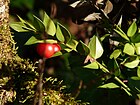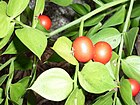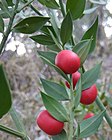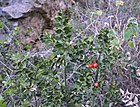Note: This is a project under development. The articles on this wiki are just being initiated and broadly incomplete. You can Help creating new pages.
Difference between revisions of "Ruscus aculeatus"
| Line 1: | Line 1: | ||
[[File:Flora della Sardegna 133 (3).JPGthumb|right|''Ruscus aculeatus'']] | [[File:Flora della Sardegna 133 (3).JPGthumb|right|''Ruscus aculeatus'']] | ||
| + | '''Ruscus aculeatus''' known as butcher's-broom is a low evergreen Eurasian shrub, with flat shoots known as cladodes that give the appearance of stiff, spine-tipped leaves. | ||
==Uses== | ==Uses== | ||
{{Uses|Haemorrhoids}}, {{Uses|Jaundice}}, {{Uses|Gout}}, {{Uses|Kidney stones}}, {{Uses|Bladder stones}}, {{Uses|Haemorrhoids}}, {{Uses|Hypertension}}, {{Uses|High blood pressure}}.<ref name="Uses"/> | {{Uses|Haemorrhoids}}, {{Uses|Jaundice}}, {{Uses|Gout}}, {{Uses|Kidney stones}}, {{Uses|Bladder stones}}, {{Uses|Haemorrhoids}}, {{Uses|Hypertension}}, {{Uses|High blood pressure}}.<ref name="Uses"/> | ||
Latest revision as of 12:28, 24 July 2020
Ruscus aculeatus known as butcher's-broom is a low evergreen Eurasian shrub, with flat shoots known as cladodes that give the appearance of stiff, spine-tipped leaves.
Contents
- 1 Uses
- 2 Parts Used
- 3 Chemical Composition
- 4 Common names
- 5 Properties
- 6 Habit
- 7 Identification
- 8 List of Ayurvedic medicine in which the herb is used
- 9 Where to get the saplings
- 10 Mode of Propagation
- 11 How to plant/cultivate
- 12 Commonly seen growing in areas
- 13 Photo Gallery
- 14 References
- 15 External Links
Uses
Haemorrhoids, Jaundice, Gout, Kidney stones, Bladder stones, Haemorrhoids, Hypertension, High blood pressure.[1]
Parts Used
Chemical Composition
Common names
| Language | Common name |
|---|---|
| Kannada | |
| Hindi | |
| Malayalam | |
| Tamil | |
| Telugu | |
| Marathi | |
| Gujarathi | |
| Punjabi | |
| Kashmiri | |
| Sanskrit | |
| English |
Properties
Reference: Dravya - Substance, Rasa - Taste, Guna - Qualities, Veerya - Potency, Vipaka - Post-digesion effect, Karma - Pharmacological activity, Prabhava - Therepeutics.
Dravya
Rasa
Guna
Veerya
Vipaka
Karma
Prabhava
Habit
Identification
Leaf
| Kind | Shape | Feature |
|---|---|---|
Flower
| Type | Size | Color and composition | Stamen | More information |
|---|---|---|---|---|
| {{{5}}} |
Fruit
| Type | Size | Mass | Appearance | Seeds | More information |
|---|---|---|---|---|---|
Other features
List of Ayurvedic medicine in which the herb is used
Where to get the saplings
Mode of Propagation
How to plant/cultivate
Tolerant of most soils, including chalky and heavy clay soils. Prefers a shady position, tolerating dense dry shade and bad growing conditions, including the drip-line of trees. Dislikes much wetness at the roots. Established plants are drought resistant.[4]
Commonly seen growing in areas
Outskirts of dry woods, Moist uncultivated ground especially on chalk
Photo Gallery
References
- ↑ Indian Medicinal Plants by C.P.Khare
- ↑ [Chemistry]
- ↑ [Morphology]
- ↑ Cultivation
External Links
- Pages with broken file links
- Ayurvedic Herbs known to be helpful to treat Haemorrhoids
- Ayurvedic Herbs known to be helpful to treat Jaundice
- Ayurvedic Herbs known to be helpful to treat Gout
- Ayurvedic Herbs known to be helpful to treat Kidney stones
- Ayurvedic Herbs known to be helpful to treat Bladder stones
- Ayurvedic Herbs known to be helpful to treat Hypertension
- Ayurvedic Herbs known to be helpful to treat High blood pressure
- Herbs with Young shoots used in medicine
- Habit - Evergreen shrub
- Index of Plants which can be propagated by Seeds
- Herbs that are commonly seen in the region of Outskirts of dry woods
- Herbs that are commonly seen in the region of Moist uncultivated ground especially on chalk
- Herbs




